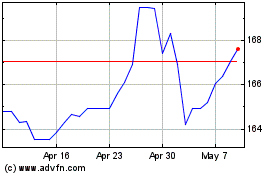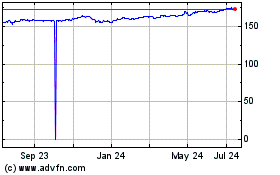Euro Falls As German Import Prices Fall To More Than 5-yr Low
February 27 2015 - 4:27AM
RTTF2
The euro declined against its most major rivals in early
European deals on Friday, after data showed that Germany's import
prices registered its worst fall in more than five years in
January.
The import price index fell 4.4 percent year-on-year at the
start of the year, faster than December's 3.7 percent decline.
Economists had forecast a 4.6 percent fall for the month.
The latest decline was the sharpest since November 2009, when
prices had fallen 5.0 percent.
Traders now focus on German inflation data for February, due
later in the day.
Inflation is expected to remain in a deflationary territory in
February, with a 0.3 percent fall annually after the 0.4 percent
drop last month. The harmonized measure of consumer prices are
expected to fall at the stable rate of 0.5 percent in February.
The currency has been already under pressure, as the European
Central Bank is starting its quantitative easing program at next
week's meeting. The quantitative easing program tends to depreciate
currency.
Elsewhere, German lawmakers are expected to approve a four-month
extension of Greece's bailout in a parliament vote later today
despite irritation among some lawmakers over recent comments by
Greek officials. Parliaments in several other European countries
must also accept the aid proposals before the current bailout
program expires Saturday.
The 19-nation currency declined to a new 3-week low of 133.51
against the yen in early deals and has been steady is subsequent
trading. At yesterday's close, the pair was quoted at 133.69.
The euro fell to a 9-day low of 1.0628 against the Swiss franc,
pulling away from an early high of 1.0691. If the euro extends
slide, 1.00 is seen as its next support level.
The single currency fell back to 1.1196 against the greenback,
not far from yesterday's more than 4-week low of 1.1183.
Continuation of the euro's downtrend may lead it to a support
around the 1.10 zone.
The euro hit 0.7256 against the Sterling, a level unseen since
December 2007. The euro may possibly find support around the 0.70
mark.
Looking ahead, the second estimate of U.S. fourth quarter GDP
data, pending home sales for January and Reuters/University of
Michigan's final consumer sentiment index for February are due in
the New York session.
Euro vs Yen (FX:EURJPY)
Forex Chart
From Mar 2024 to Apr 2024

Euro vs Yen (FX:EURJPY)
Forex Chart
From Apr 2023 to Apr 2024
